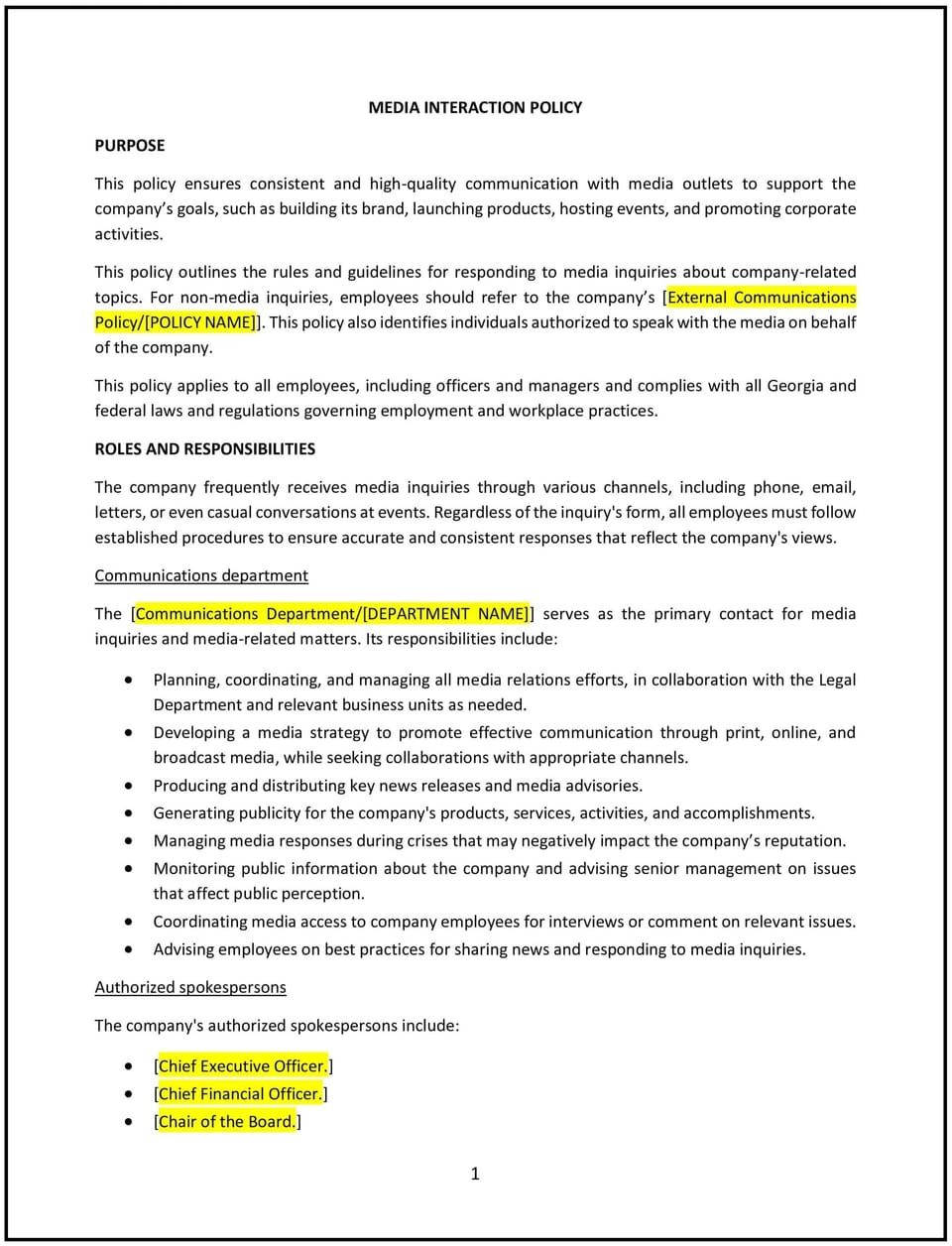Media relations policy (Georgia): Free template

Media relations policy (Georgia)
This media relations policy is designed to help Georgia businesses manage interactions with the media effectively and professionally. The policy outlines procedures for responding to media inquiries, designating spokespersons, and ensuring consistent and accurate messaging.
By implementing this policy, businesses can protect their reputation, promote transparency, and maintain control over public communications.
How to use this media relations policy (Georgia)
- Designate spokespersons: Clearly identify individuals authorized to speak on behalf of the business, such as executives, PR personnel, or managers.
- Establish approval processes: Require media statements, press releases, or interviews to be approved by the designated spokesperson or PR team before release.
- Address unsolicited media inquiries: Direct employees to refer all media inquiries to the designated spokesperson without providing unauthorized information.
- Provide training: Offer media training to authorized spokespersons to ensure they are prepared to handle interviews or public appearances.
- Develop messaging guidelines: Create a framework for crafting consistent and accurate messaging that aligns with the business’s values and goals.
- Monitor media coverage: Regularly track mentions of the business in the media to address inaccuracies or respond to opportunities proactively.
- Protect confidentiality: Prohibit the disclosure of sensitive or proprietary information in media interactions.
- Review and update regularly: Periodically assess the policy to reflect changes in Georgia-specific business practices, media trends, or organizational needs.
Benefits of using this media relations policy (Georgia)
Implementing this policy provides several advantages for Georgia businesses:
- Protects reputation: Clear procedures ensure consistent and professional communication with the media.
- Enhances transparency: A structured approach promotes accurate and open communication with stakeholders and the public.
- Mitigates risks: Prevents the release of unauthorized or damaging information that could harm the business.
- Builds trust: Professional and consistent media interactions enhance the business’s credibility and public image.
- Reflects Georgia-specific needs: Tailoring the policy to local industries and cultural dynamics ensures its relevance and effectiveness.
Tips for using this media relations policy (Georgia)
- Communicate the policy: Ensure all employees understand the importance of referring media inquiries to authorized spokespersons.
- Prepare in advance: Develop key messaging and media responses for potential topics of interest to streamline communications.
- Act promptly: Respond to media inquiries quickly to maintain professionalism and control the narrative.
- Foster relationships: Build positive relationships with local Georgia media outlets to create opportunities for favorable coverage.
- Monitor and adjust: Use feedback and media coverage analysis to refine messaging and improve media interactions.
Q: Who is authorized to speak to the media on behalf of the business?
A: Only designated spokespersons, such as executives or PR personnel, are authorized to interact with the media.
Q: What should employees do if approached by the media?
A: Employees should refer all media inquiries to the designated spokesperson and avoid providing unauthorized information.
Q: How can businesses prepare for media interviews?
A: Businesses should develop key talking points, anticipate potential questions, and ensure spokespersons have received media training.
Q: What should businesses include in press releases?
A: Press releases should include accurate and concise information, aligned with the business’s messaging and goals, and be approved by the PR team.
Q: How can businesses handle negative media coverage?
A: Businesses should assess the situation, provide accurate responses to address inaccuracies, and, if necessary, issue a formal statement to clarify their position.
Q: How often should media interactions be monitored?
A: Media coverage should be monitored regularly to identify opportunities, address inaccuracies, or stay informed about public perceptions.
Q: How often should this policy be reviewed?
A: The policy should be reviewed annually or as needed to reflect changes in Georgia’s media landscape or business objectives.
This article contains general legal information and does not contain legal advice. Cobrief is not a law firm or a substitute for an attorney or law firm. The law is complex and changes often. For legal advice, please ask a lawyer.


